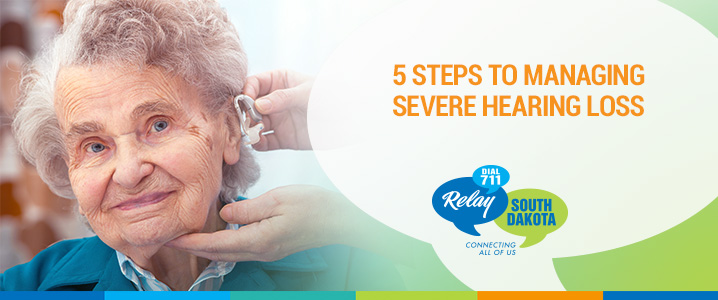
5 Steps to Managing Severe Hearing Loss

Hearing loss happens because of losses of or damage to cilia, the tiny hairs located in your inner ear. Because these hairs can’t be regenerated, it is important to note that any treatment for hearing loss will likely not restore your original levels of hearing ability.
However, there are ways to work with your doctor in order to help you regain some of your hearing.
1. Talk to a Doctor
Although a large number of people experience noise-related hearing loss, many other causes of hearing loss are medical – and treatable. If you visit a doctor in a timely manner, he or she may be able to intervene before you reach a permanent level of hearing loss.
(NOTE: While not definitive, potential causes of hearing loss can include ear infections, earwax build-up and anatomical defects in the bones of the ear.)
2. Obtain a Hearing Evaluation
If it has been determined that the cause of your hearing loss is not medical, you should obtain a hearing evaluation as quickly as possible. Hearing tests will analyze your ability to differentiate between sounds, such as different words, as well as different pitches and volumes. A hearing evaluation will also test how well sound passes from your ear to your brain.
3. Discuss Treatment Options
Gone are the days when the only thing available to someone with hearing loss was a gigantic ear trumpet. The type of hearing loss you have will determine which of the many treatment options available your doctor recommends. For example, cochlear implants are electronic devices that stimulate hearing nerves in your ear. The results can be drastic, but they don’t work for everyone. Hearing aids, on the other hand, don’t require surgery and are more common. But a hearing aid just raises the volume on sound; it doesn’t actually restore you hearing. Discuss all your options with an audiologist to determine what is right for you.
4. Take Advantage of Your Treatment
It is well documented that many people who are outfitted for a hearing aid are unable to use it properly or often. Whether this is due to embarrassment or lack of knowledge, avoiding your hearing-loss treatment will not help you in the long run. Learn to use your hearing aid correctly and consistently. Contact your audiologist with questions you may have or adjustments you may need.
5. Learn to Live with Hearing Loss
Learning to live with hearing loss can be a major adjustment. Luckily, there are many hearing-assistive devices that can help you continue to live a full and healthy life. Discuss options with your doctor such as alerting devices, which use flashing lights to signal doorbells or ringing phones. Cell phones and texting have become extremely helpful tools for people with hearing loss. State services, such as Relay South Dakota, offer telephone accessibility to people who are deaf or hard of hearing.
Learn more about how we can help you live your best life with hearing loss today.
Found in: Health

